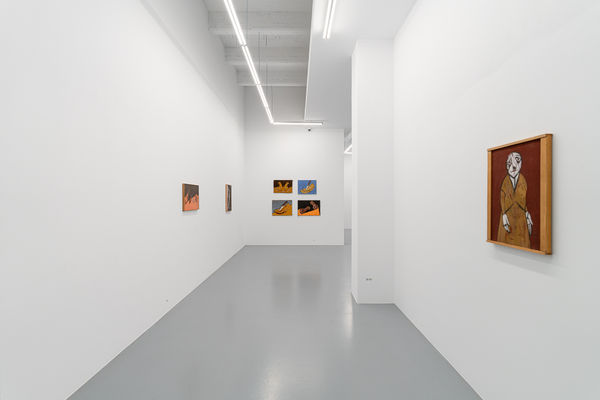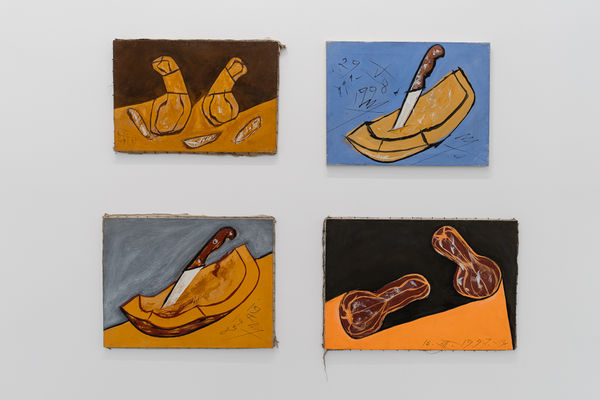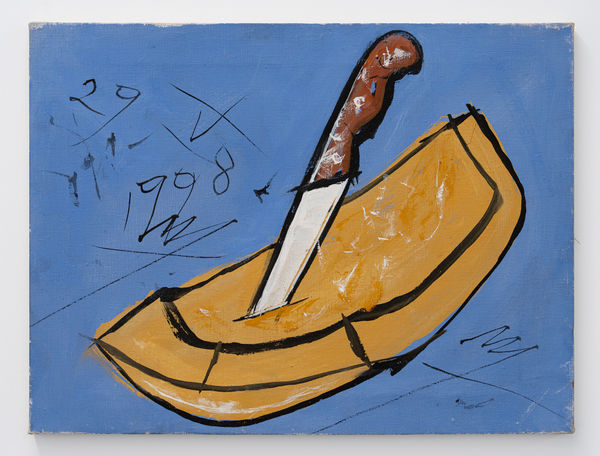Florin Mitroi: Ch. II: Autumn: Curated by Erwin Kessler
-
 Florin MitroiXI.1991, 1991Tempera on wood66 x 52 cm.
Florin MitroiXI.1991, 1991Tempera on wood66 x 52 cm.
26 x 20 1/2 in. -
 Florin MitroiOnions, 1975Tempera on canvas42 x 66 cm.
Florin MitroiOnions, 1975Tempera on canvas42 x 66 cm.
16 1/2 x 26 in. -
 Florin Mitroi19.IX.1990, 1990Tempera on canvas66 x 52 cm.
Florin Mitroi19.IX.1990, 1990Tempera on canvas66 x 52 cm.
26 x 20 1/2 in. -
 Florin Mitroi29.V.1998, 1998Tempera on canvas46 x 61 cm.
Florin Mitroi29.V.1998, 1998Tempera on canvas46 x 61 cm.
18 1/8 x 24 in. -
 Florin Mitroi19.I.1998, 1998Tempera on canvas50 x 65 cm.
Florin Mitroi19.I.1998, 1998Tempera on canvas50 x 65 cm.
19 3/4 x 25 5/8 in. -
 Florin Mitroi16.XII.1997, 1997Tempera on canvas50 x 73 cm.
Florin Mitroi16.XII.1997, 1997Tempera on canvas50 x 73 cm.
19 3/4 x 28 3/4 in. -
 Florin Mitroi1986, 1986Tempera on canvas40 x 50 cm.
Florin Mitroi1986, 1986Tempera on canvas40 x 50 cm.
15 3/4 x 19 3/4 in. -
 Florin Mitroi24.I.1994, 1994Tempera on canvas60 x 38 cm.
Florin Mitroi24.I.1994, 1994Tempera on canvas60 x 38 cm.
23 5/8 x 15 in. -
 Florin Mitroi4.XI.1994, 1994Tempera on canvas60 x 38 cm.
Florin Mitroi4.XI.1994, 1994Tempera on canvas60 x 38 cm.
23 5/8 x 15 in. -
 Florin Mitroi15.XI.1993, 1993Tempera on canvas55 x 41 cm.
Florin Mitroi15.XI.1993, 1993Tempera on canvas55 x 41 cm.
21 5/8 x 16 1/8 in. -
 Florin Mitroi15.XI.1993, 1993Tempera on canvas53 x 41 cm.
Florin Mitroi15.XI.1993, 1993Tempera on canvas53 x 41 cm.
20 7/8 x 16 1/8 in. -
 Florin Mitroi1978, 1978Tempera on wood56 x 39 cm.
Florin Mitroi1978, 1978Tempera on wood56 x 39 cm.
22 x 15 3/8 in. -
 Florin MitroiUntitledTempera on wood54 x 81 cm.
Florin MitroiUntitledTempera on wood54 x 81 cm.
21 1/4 x 31 7/8 in. -
 Florin Mitroi1980, 1980Tempera on wood67x50cm
Florin Mitroi1980, 1980Tempera on wood67x50cm -
 Florin MitroiTorso, 1995Ready-madeVariable dimensions
Florin MitroiTorso, 1995Ready-madeVariable dimensions -
 Florin MitroiTorso (7.09.1995), 1995Ready-madeVariable dimensions
Florin MitroiTorso (7.09.1995), 1995Ready-madeVariable dimensions -
 Florin MitroiTorso 3, 1976Ready-made and gold leafVariable dimensions
Florin MitroiTorso 3, 1976Ready-made and gold leafVariable dimensions -
 Florin MitroiTorso (1999), 1999Ready-madeVariable dimensions
Florin MitroiTorso (1999), 1999Ready-madeVariable dimensions -
 Florin MitroiTorso I, 1976Ready-made and gold leafVariable dimensions
Florin MitroiTorso I, 1976Ready-made and gold leafVariable dimensions -
 Florin MitroiTorso (2.IV.1995), 1995Ready-made and golden leafVariable dimensions
Florin MitroiTorso (2.IV.1995), 1995Ready-made and golden leafVariable dimensions -
 Florin MitroiTorso IV, 1978Ready-madeVariable dimensions
Florin MitroiTorso IV, 1978Ready-madeVariable dimensions -
 Florin MitroiTorso (11.IV.1995), 1995Ready-madeVariable dimensions
Florin MitroiTorso (11.IV.1995), 1995Ready-madeVariable dimensions -
 Florin MitroiTorso 2, 1976Ready-madeVariable dimensions
Florin MitroiTorso 2, 1976Ready-madeVariable dimensions -
 Florin Mitroi1982, 1982Tempera on wood72 x 53 cm.
Florin Mitroi1982, 1982Tempera on wood72 x 53 cm.
28 3/8 x 20 7/8 in. -
 Florin Mitroi12.XI.1968, 1968Ink on paper43 x 56 cm.
Florin Mitroi12.XI.1968, 1968Ink on paper43 x 56 cm.
16 7/8 x 22 in. -
 Florin Mitroi3.X.1968, 1968Ink on paper43 x 56 cm.
Florin Mitroi3.X.1968, 1968Ink on paper43 x 56 cm.
16 7/8 x 22 in. -
 Florin Mitroi30.X.1968, 1968Ink on paper43 x 56 cm.
Florin Mitroi30.X.1968, 1968Ink on paper43 x 56 cm.
16 7/8 x 22 in. -
 Florin Mitroi1.Nov.1968, 1968Ink on paper43 x 56 cm.
Florin Mitroi1.Nov.1968, 1968Ink on paper43 x 56 cm.
16 7/8 x 22 in. -
 Florin Mitroi30.X.1968, 1968Ink on paper43 x 56 cm.
Florin Mitroi30.X.1968, 1968Ink on paper43 x 56 cm.
16 7/8 x 22 in. -
 Florin Mitroi20.VII.1973, 1973Ink on paper43 x 56 cm.
Florin Mitroi20.VII.1973, 1973Ink on paper43 x 56 cm.
16 7/8 x 22 in. -
 Florin Mitroi20.VII.1973, 1973Ink on paper43 x 56 cm.
Florin Mitroi20.VII.1973, 1973Ink on paper43 x 56 cm.
16 7/8 x 22 in. -
 Florin Mitroi21.6.1972, 1972Ink on paper43 x 56 cm.
Florin Mitroi21.6.1972, 1972Ink on paper43 x 56 cm.
16 7/8 x 22 in. -
 Florin Mitroi12.X.1976, 1976Ink on paper55 x 67 cm.
Florin Mitroi12.X.1976, 1976Ink on paper55 x 67 cm.
21 5/8 x 26 3/8 in. -
 Florin Mitroi18.11.1971, 1971Ink on paper43x56cm
Florin Mitroi18.11.1971, 1971Ink on paper43x56cm
Several months ago, files, folders, and bundles of notebooks, drawings, works on wood and metal — forgotten in storage for nearly 20 years — were (re)discovered. Over 600 previously unseen pieces, which had never before been exhibited, now come to complete the base of an unfathomable pyramid of meaning called Florin Mitroi. These works make up a large part of those shown in Florin Mitroi's Autumn: a personal season like a fierce beast, tumultuous, full of passion, pain, and ecstasy.
In moments of reckoning at the close of shortened days — a harsh, rigorous, and inescapable reckoning such as Mitroi's — what do you do if you come to believe that "Every moment is a humiliation / And life has passed you by"? (Mitroi: 20.VII.1973). What do you do when you are convinced that you have no oeuvre, only failures, that you are not progressing but regressing? You come to think you will never attain what you seek that it simply does not exist.
But what if you are mistaken? What if your failures prove to be the cornerstones of an unparalleled edifice? Florin Mitroi was quick to make pessimistic assessments, inclined to judge his own creation with extreme harshness — over 90% of it he never exhibited, and the few works he did show in his sole solo exhibition he bitterly regretted. Only after his passing could the bottomless abyss of a suffocating and at the same time exhilarating oeuvre be sounded.
An oeuvre driven forward, to peaks of formal perfection and moral desolation, by the very unfavorable reckonings its author made systematically. An author who left behind more than 8000 works, meant to probe the dehumanized condition down to the finest fibers of fear.
Mitroi's Autumn is the season of his self-flagellation and of our delight.
Text by Erwin Kessler

















































